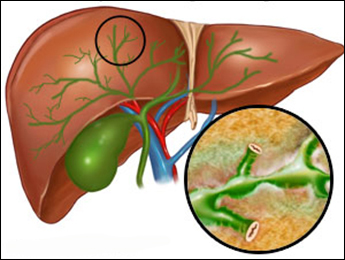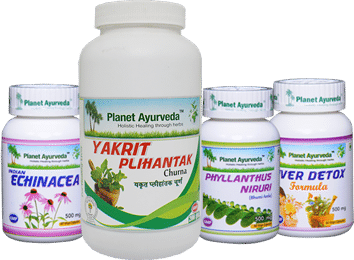Primary Sclerosing Cholangitis (PSC)

Introduction
Primary sclerosing cholangitis is a chronic disease of the “hepatobiliary system”. It is an inflammatory disease of the liver and gall bladder that leads to scar formation in the bile ducts that usually drain the bile from the gallbladder and passes it to the bowel to help digestion of fats.
In primary sclerosing cholangitis, the bile ducts are usually blocked due to inflammation, scarring and fibrosis. Because of this the bile starts accumulating inside the liver (as the liver is the organ that produces bile) in turns develops pressure on the liver and impairs its functions, hence, it gives rise to a severe complication as liver damage or liver cirrhosis. The incidence ratio is higher in males, and in the middle-aged group.
As per Ayurveda any inflammation inside the body occurs due to the vitiation of all the three doshas especially the pitta dosha as liver is the prime site of pitta in our body.
What are the Causes of Primary Sclerosing Cholangitis?
The exact etiology is still unknown but some causative factors are :-
- Dietary factors like – Excessive consumption of spicy, sour, hot foodstuffs like – refined foods, non-vegetarian food, sauces, chilly, etc.
- Lifestyle management – Sedentary lifestyle, excessive exposure to harmful radiations, excessive fasting, irregular food habits, aggravates pitta dosha in our body.
- Genetic predispositions
- Any cause that leads to hormonal imbalance may develop this condition.
- Any disease history of autoimmune disorders
- Some ‘RISK FACTORS’ are –
- Hepatitis
- Excessive intake of Alcohol
- Obesity
What are the Signs and Symptoms of Primary Sclerosing Cholangitis?
The most common symptoms of this disease are :-
- Pain in the right hypochondriac region
- Acidity
- Itching
- Splenomegaly (enlarged spleen)
- Hepatomegaly (enlarged liver)
- Dark urine (due to obstructed bilirubin)
- Dark stool (absence of stercobilin)
- Yellowness of skin, eyes, nails, etc.
- Portal hypertension
- Fever
- Chills
- Indigestion
- Malabsorption
- Weakness
Classification
Primary sclerosing cholangitis can be classified into three categories, they are :-
- Classic Primary Sclerosing Cholangitis
- Small-duct Primary Sclerosing Cholangitis
- Primary Sclerosing Cholangitis associated with autoimmune hepatitis.
Diagnostic Criteria
On the clinical basis a diagnosis of the disease is not confirmed hence, some of the laboratory investigation is necessary like :-
- Serum alkaline phosphatase (ALP)
- USG (Ultrasonography)
- ERCP (Endoscopic retrograde cholangiopancreatography)
- MRCP (Magnetic resonance cholangiopancreatography)
- Immunological assay
- Liver biopsy
Management Criteria
As per Ayurveda the management criteria include :-
- Measures to balance tridoshas
- Detoxification of the body (to excrete aama /toxins)
- Reduce inflammation and, clear the obstruction.
- Heal the erosion (scarring)
- Restore the normal functions of the liver and gallbladder.
Herbal Remedies for Primary Sclerosing Cholangitis
Planet Ayurveda is offering various formulations that are prepared from the purely natural herbs, natural minerals and calcium compounds. To tackle ‘Primary Sclerosing Cholangitis’, Planet Ayurveda came with the ‘Liver Care Pack’ which is composed of various effective herbs. This pack include –
1. Echinacea Capsules
Kalmegha is an excellent herb that is really useful in liver and renal disorders. It has diuretic and rejuvenating properties that are required to be utilized in case of primary sclerosing cholangitis to cure erosions. It is helpful to correct hormonal imbalance and also strengthen the immune system. These capsules are useful to relieve all the associated symptoms like weakness, weight loss, etc.
Dosage – 1 or 2 capsules twice daily with warm water after meals.
2. Yakrit Plihantak Churna
It is one of the effective remedy which consist of Bhumiamlaki (Phyllanthus niruri), Kalmegha (Andographis panniculata), Bhringraj (Eclipta alba), Sharpunkha (Tephrosia purpurea), Makoy (Solanum indicum), Punarnava (Boerhavia diffusa), etc. All these herbs are helpful in this condition because they eliminate the toxins from the body, rejuvenate the damaged cells (cells of the liver, gall bladder and spleen) and also restores the normal functions of the organ.
Dosage – 1 teaspoon twice daily with warm water after meals.
3. Phyllanthus Niruri
These capsules are composed of pure extract of bhumiamlaki (Phyllanthus niruri) that possesses diuretic and anti-inflammatory properties. It helps to stimulate the production and secretion of bile from the liver through bile ducts hence aids digestion and proper absorption of nutrients in the body. It also reduces the inflammation due to its diuretic property.
Dosage – 1 or 2 capsules twice daily with warm water after meals.
4. Liver Detox Formula
A unique preparation of Planet Ayurveda that potentially and naturally cleanses the liver thus, beneficial to deals with the ailments of the hepatobiliary system. It eliminates toxins from the liver hence, improves metabolism. Along with that it also prevents the complication of liver diseases.
Dosage – 1 or 2 capsules twice daily with warm water after meals.
Precautions
- Avoid the use of aerated drinks, alcohol, etc.
- Avoid consumption of spicy, sour and fermented foods.
- Give importance to green leafy vegetables, fresh fruits (but avoid citrus fruits), sprouts, etc.
Complication
If this disease is not treated on time leads to Liver damage and Liver cirrhosis.
Useful Tip
Boil a ½ teaspoon (each) of dhaniya (Coriander), saunf (Fennel) and jeera (Cumin) in 3 cups of water, boil it until it reduces to 1 cup. Take this decoction twice daily, after meals to combat acidity, anorexia, indigestion, etc.




